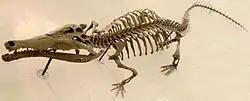Toyotamaphimeia
Toyotamaphimeia machikanensis (Toyotama-hime from Moutain Machikane (ja:待兼山)) is an extinct tomistomine crocodylian which lived in Japan and Taiwan during the Pleistocene. A specimen recovered in 1964 at Osaka University during the construction of a new science building has been dated to around 430–380 thousand years old based on the stratum in which it was found.[1] T. machikanensis was a fairly large crocodylian with a 1 m (3.3 ft) skull and a total length up to 7.7 m (25 ft).[2] It is closely related to the false gharial and was originally described as a member of the same genus, Tomistoma.
| Toyotamaphimeia Temporal range: Pleistocene | |
|---|---|
 | |
| Toyotamaphimeia machikanense skeleton | |
| Scientific classification | |
| Kingdom: | Animalia |
| Phylum: | Chordata |
| Class: | Reptilia |
| Order: | Crocodilia |
| Family: | Gavialidae |
| Subfamily: | Tomistominae |
| Genus: | †Toyotamaphimeia Aoki, 1983 |
| Type species | |
| Toyotamaphimeia machikanensis (Kobatake et al., 1965) | |
| Synonyms | |
| |
The fossil of T. machikanensis have some damage that seems to have occurred during its lifetime, such as amputated mandible. It is believed to have been caused by multiple intraspecific fights. [3] Toyotamaphimeia is known to lived near lower thermal limit of crocodilians.[4]
Sources
- "Valuable Specimen which Osaka University Possesses". Archived from the original on 2005-03-06.
- "Machikane Crocodylidae (Toyotamaphimeia Machikanensis) fossil designated as national treasure". 大阪大学. Retrieved 2021-02-05.
- Katsura, Yoshihiro (2004-06-01). "Paleopathology of Toyotamaphimeia machikanensis (Diapsida, Crocodylia) from the Middle Pleistocene of Central Japan". Historical Biology. 16 (2–4): 93–97. doi:10.1080/08912963400015041. ISSN 0891-2963.
- Iijima, Masaya; Momohara, Arata; Kobayashi, Yoshitsugu; Hayashi, Shoji; Ikeda, Tadahiro; Taruno, Hiroyuki; Watanabe, Katsunori; Tanimoto, Masahiro; Furui, Sora (2018-05-01). "Toyotamaphimeia cf. machikanensis (Crocodylia, Tomistominae) from the Middle Pleistocene of Osaka, Japan, and crocodylian survivorship through the Pliocene-Pleistocene climatic oscillations". Palaeogeography, Palaeoclimatology, Palaeoecology. 496: 346–360. doi:10.1016/j.palaeo.2018.02.002. ISSN 0031-0182.
